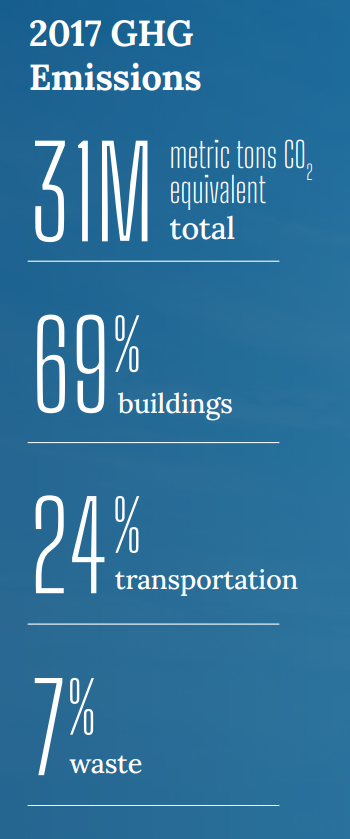Electrify Chicago
An independent tool for viewing City of Chicago building data
According to the
2022 Chicago Climate Action Plan,
69% of Chicago's emissions come from buildings, making
building emissions our biggest challenge and our biggest opportunity as a city
to tackle climate change. At Electrify Chicago, we showcase building performance using
publicly available data supplemented by community-submitted photographs and building
owners.
Start by looking at Chicago's buildings with the highest greenhouse gas intensity i.e. emissions per square foot. Large, efficient, buildings can perform much better than very inefficient small buildings on this metric.
New Article
📰 $30 Million In Missed Fines
The City Of Chicago failed to collect $30 million in potential fines from the building benchmarking ordinance, reducing transparency and accountability.
Legislative update! 🎉
As of late January 2024, legislation is being introduced to require new use more efficient forms of water and space heating, via the Clean And Affordable Buildings Ordinance (CABO), which will reduce the number of highly polluting and inefficient buildings that end up on this site.
If you're in Chicago,
write to your alderman to support the CABO!
Chicago Buildings by Greenhouse Gas Intensity
Note: Data includes large Chicago buildings with data from 2022, unless explicitly stated otherwise.
Note: This data only includes buildings whose emissions are reported
under the
Chicago Energy Benchmarking Ordinance. According to the City “As of 2016,
this list includes all commercial, institutional, and residential buildings larger than
50,000 square feet.” This dataset is also then filtered to only buildings with
reported emissions > 1,000 metric tons CO2 equivalent.
The latest year of data is from 2022, but we update the site regularly when new data is available, and some buildings may have failed to report that year, and only have older data available.
| Property Name / address | Primary Property Type |
Greenhouse Gas Intensity (kg CO2 eq./sqft) |
Total Greenhouse Emissions (metric tons CO2 eq.) |
|---|---|---|---|
|
2769 2789 N MILWAUKEE AVE
2769 2789 N MILWAUKEE AVE
| Multifamily Housing | 7.8 kg/sqft
Highest 27%
| 392 tons
Lowest 16%
|
|
Home Depot, #1912 North Ave
1232 W North Ave
| Retail Store | 7.8 kg/sqft
Highest 27%
| 1,312 tons
Highest 36%
|
|
Ike Sims Village
3333 W MAYPOLE AVE
| Multifamily Housing | 7.8 kg/sqft
Highest 27%
| 609 tons
Lowest 34%
|
|
Bel Harbour Condominium Association
420 W BELMONT AVE
| Multifamily Housing | 7.8 kg/sqft
Highest 27%
| 1,705 tons
Highest 27%
|
|
5525 N WINTHROP AVE
5525 N WINTHROP AVE
| Multifamily Housing | 7.8 kg/sqft
Highest 27%
| 403 tons
Lowest 17%
|
|
601 E 32ND ST
601 E 32ND ST
| Multifamily Housing | 7.8 kg/sqft
Highest 27%
| 1,492 tons
Highest 31%
|
|
203 N LaSalle St
203 N LaSalle St
| Office | 7.8 kg/sqft
Highest 27%
| 4,849 tons
Highest 7%
|
|
5400 N NORTHWEST HWY
5400 N NORTHWEST HWY
| Senior Living Community | 7.8 kg/sqft
Highest 27%
| 465 tons
Lowest 23%
|
|
101 North Wacker
101 N Wacker Dr
| Office | 7.8 kg/sqft
Highest 27%
| 5,181 tons
Highest 6%
|
|
5110 S DR MARTIN LUTHER KING JR DR
5110 S DR MARTIN LUTHER KING JR DR
| Multifamily Housing | 7.8 kg/sqft
Highest 27%
| 896 tons
Highest 49%
|
|
1323 W Morse Ave
1323 W Morse Ave
| Multifamily Housing | 7.7 kg/sqft
Highest 29%
| 438 tons
Lowest 20%
|
|
Hubbard221
221 W Hubbard St
| Multifamily Housing | 7.7 kg/sqft
Highest 29%
| 1,345 tons
Highest 35%
|
|
Viridian on Sheridan
734 W Sheridan Rd
| Multifamily Housing | 7.7 kg/sqft
Highest 29%
| 794 tons
Lowest 46%
|
|
American Red Cross Greater Chicago
🕰️
2200 W. Harrison St.
| Office | 7.7 kg/sqft | 480 tons |
|
Merrimac Square
🕰️
6530 West Irving Park Road
| Multifamily Housing | 7.7 kg/sqft | 550 tons |
Data Source:
Chicago Energy Benchmarking Data
